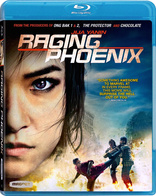Raging Phoenix Blu-ray Movie
HomeRaging Phoenix Blu-ray Movie 
Deu suay dooMagnolia Pictures | 2009 | 112 min | Rated R | Sep 14, 2010
Price
List price:Amazon: $8.49 (Save 50%)
Third party: $8.49 (Save 50%)
Only 16 left in stock - order soon.
Movie rating
6.6 | / 10 |
Blu-ray rating
| Users | 0.0 | |
| Reviewer | 2.0 | |
| Overall | 2.0 |
Overview
Raging Phoenix (2009)
Deu, a girl with equally high degree of recklessness and beauty has never experienced 'true love'. One day her life changes completely when some gangsters try to kidnap her and she narrowly escapes with the help of Sanim, a sad looking stranger with a painful past. Waking up in an abandoned factory, she joins his gang of merry do-gooders who practice a form of drunken Thai break-dancing martial arts that they dub Meyraiyuth. Sanim and his friends, having had loved ones abducted, join together to break the gang of kidnappers.
Starring: JeeJa Yanin, David Bueno, Marc Nghi Hoang, Kazu Patrick TangDirector: Rashane Limtrakul
| Foreign | Uncertain |
| Action | Uncertain |
| Martial arts | Uncertain |
| Romance | Uncertain |
Specifications
Video
Video codec: MPEG-4 AVC
Video resolution: 1080p
Aspect ratio: 1.78:1
Original aspect ratio: 1.85:1
Audio
English: DTS-HD Master Audio 5.1
Thai: DTS-HD Master Audio 5.1
stated on back and confirmed BDInfo and in AVR
Subtitles
English, English SDH, Spanish
Discs
25GB Blu-ray Disc
Single disc (1 BD)
BD-Live
Playback
Region A (B, C untested)
Review
Rating summary
| Movie | 2.0 | |
| Video | 3.0 | |
| Audio | 3.5 | |
| Extras | 1.5 | |
| Overall | 2.0 |
Raging Phoenix Blu-ray Movie Review
Rage, rage, against the dying of the Thai martial arts film.
Reviewed by Casey Broadwater September 16, 2010Newcomer Tony Jaa elbow-dropped unsuspecting international audiences with the 2003 release of Ong-Bak, a fast and furious Bangkok beat ‘em up that introduced the world to the “no wires, no harness” wonders of Thai martial arts. Since then, Jaa, director Prachya Pinkaew, and their protégés have released a steady output of similar films, some better than others. For every badass romp like Tom-Yum-Goong or the historical epic Ong-Bak 2, there’s a lesser entry in the Thai martial arts canon, like Power Kids or Tsunami Warrior. Good or bad, the one constant in all of these films is that the stories inevitably—for a lack of a better word—suck. Sometimes it doesn’t really matter. When Tony Jaa is onscreen, the spectacle of his insane acrobatics is often enough to carry a film that might otherwise have little going for it. Hardcore action fans may contest that the story in a martial arts movie is irrelevant, that the plot is just a means to positions the characters for the next over-the-top set piece. To a certain extent, this may be true, but I don’t think anyone would argue against the fact that a film with hard-hitting action and a strong story offers a much better experience. Raging Phoenix, unfortunately, has neither.
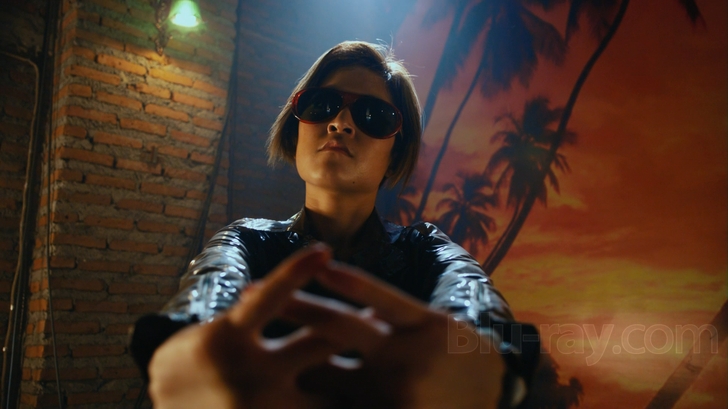
Phoenix, preparing to rage...
This may surprise some martial arts aficionados, as the film stars Yanin “Jeeja” Vismistananda, a female fighter who gave a brutal breakout performance in director Prachya Pinkaew’s well-received Chocolate. That film is about an autistic girl who becomes a kind of Muay Thai boxing savant, and it was graced with the memorable tagline, “A special-needs girl, with a special need to kick ass.” Raging Phoenix’s story is weirder—by far—but weirder doesn’t exactly equal better. Jeeja plays Deu, a drummer in a Bangkok rock band who goes on a serious bender after she discovers her boyfriend is seeing another woman. As she stumbles drunkenly through a parking garage, a pair of thugs in a sketchy-looking van attempt to kidnap her, but she’s whisked away by a mysterious man who carries her out to what I can only describe as an abandoned carnival, where—and hold on to your hats—they’re attacked by thugs wearing pogo-stilts adorned with enormous serrated blades. It’s just as ridiculous as it sounds. Deu’s savior, Sanim (Kazu Patrick Tang), is the leader of a group that exists solely to rescue women from human traffickers. Sanim and the other members—named, no joke, Pigshit, Dogshit, and Bullshit—have all lost the women in their lives and are looking for vengeance. They’re also practitioners of meyraiyuth, the Thai equivalent of drunken boxing. As Pigshit, or Horseshit, or one of the shits explains to Deu, to become proficient in this inebriation-centric art requires you to embrace your inner miserable-ness. Only the truly depressed can become meyraiyuth masters. The heartbroken Deu obviously qualifies.
Okay, here’s where things get weird—and jumbled, and boring, and nearly incoherent. The bad guys in this film—the Jaguar gang—are only stealing girls with a particular smell. They’ve got nasally-acute thugs hanging out around town, sniffing for a specific pheromone, represented onscreen by a CGI ripple that drifts across the frame and into the baddies’ nostrils. It is suggested that the Jaguar crew has found a way to extract the pheromone and make a perfume that turns rich dudes into sex addicts—or something like that—but it turns out their plan is even more nefarious. They’re also harvesting tears, life-prolonging tears. They’re led by an angry female body builder who spouts lines like, “The penalty for stealing my flower is death!” Girls hang by chains from the ceiling, wrapped like leftovers in cellophane. None of it makes much sense. I basically gave up on trying to follow the asinine plot after the first forty-five minutes. It’s just not worth it. The characters are cardboard, but they still lapse into typical Thai movie melodrama. Deu cries a lot. The villains just glower. Worse, Raging Phoenix is easily the most poorly edited film I’ve seen all year. Nearly every scene feels like it drags on for four minutes longer than it should. There are redundant flashbacks, conversations comprised solely of exposition, and long sequences where nothing happens at all. Even the requisite training montage moves at a glacial pace. At one point, thinking the film was almost over, I checked to see how much time was left—I wasn’t even halfway through.
“But what,” you ask, “about the fight scenes?” Unfortunately, they suffer the same snooze-inducing fate. Don’t get me wrong—Jeeja is clearly talented, and if there’s a female equivalent to Tony Jaa, it’s definitely her. The problem here is the choreography and editing. Where Jaa’s moves feel spontaneous—almost improvised—Jeeja’s fight sequences have a studied, carefully rehearsed vibe. This is partly intentional; the fictional meyraiyuth is a stylistic mash-up of Muay Thai and B-boy/breakdance moves, making each fight seem more like a dance battle—with each “team” going through their practiced routines—than a down and dirty, life or death struggle. Plus, there’s really nothing here that we haven’t seen before. Even the film’s climax—a beatdown that takes place on several rope bridges spanning a chasm—pales next to epic fight that takes place on the side of a building in Chocolate. There’s also a distinct slowness to the way the fight scenes are edited. I generally dislike tight, quick-cut shaky cam—where you can never really tell what’s going on—but Raging Phoenix’s approach, while completely opposite, is just as ineffective. The camera pulls back so we can see the full bodies of the actors—which is good, especially for showing off their acrobatic talents—but the editing is lethargic. With a story so dull, I’d usually recommend fast-forwarding to the fight scenes, but in Raging Phoenix you’ll probably want to skip through those too.
Raging Phoenix Blu-ray Movie, Video Quality 
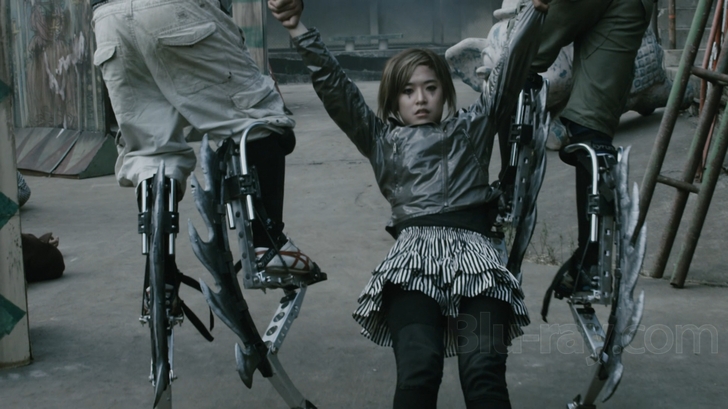
Raging Phoenix rises on Blu-ray with a 1080p/AVC-encoded transfer, framed in a screen-filling 1.78:1 aspect ratio. The film probably looks as good as it's ever going to here, but the filmmakers' helter-skelter stylistic approach often makes the high definition image hard to appreciate. The color palette changes—drastically—in just about every scene. On the beach, there's a super-saturated cross-processed look, with extreme yellowish green highlights. During the "pogo-stilts" fight, everything goes a bleak gray. Inside the Jaguar gang's hideout, the picture is desaturated except for reds, which make the characters' lips pop awkwardly. Skin tones, consequently, are all over the spectrum, from deathly pallid to intense yellow, and black levels vary. The stylization doesn't stop at color; the flashback sequences feature an image that's clearly been vertically stretched—for whatever reason—and while some scenes have a warm filmic look, others have a smeary shot-on-video quality. It could be DNR, it could be actual video—the insane color gimmickry honestly makes it hard to tell. Unsurprisingly, then, clarity is inconsistent. There are close-ups that look fantastically sharp—showing off facial detail and clothing texture—and elsewhere the picture is soft and indistinct. Aside from some slight banding in a few scenes—noticeable in the fog/steam—there are no real compression problems.
Raging Phoenix Blu-ray Movie, Audio Quality 
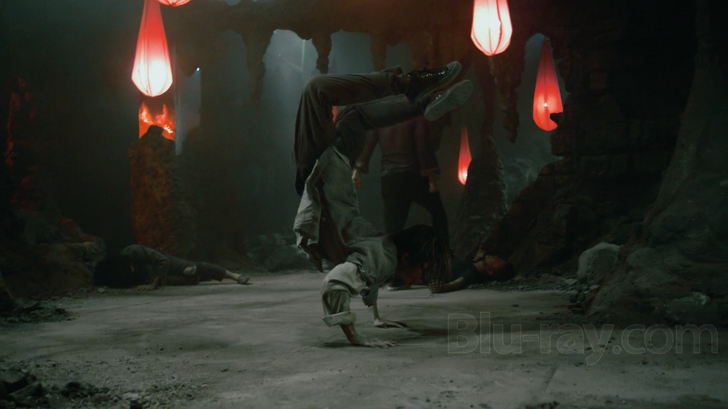
Magnolia Home Entertainment has supplied Raging Phoenix with two lossless DTS-HD Master Audio 5.1 surround options—an English dub track and the original Thai mix. The film defaults to the dub, which—no surprise here—is pretty ridiculous. The weird thing is, I ended up preferring it to the original language track. Why, you ask? Because I was so bored by the film about 50 minutes in that I turned on the English track just so I could be entertained by something. In terms of actual sound quality, both tracks—aside from the dialogue—are nearly identical. The only real difference I noticed was that the dialogue in the dub is a good bit louder than the voices in the Thai mix, which sometimes get buried under other sounds. The rear speakers get a lot of play throughout; you'll hear club ambience at a rock show, the hush of wind and lapping water, and, of course, loads of cross-channel fight scene sounds as the character punch, kick, and leap acrobatically throughout the frame. None of this sounds particularly realistic, or even well implemented—the effects and pans are definitely stocky—but, like the film's color palette, I don't think realism was the intent. Most of the fight sequences are accompanied by rock/techno/Thai hip-hop tracks that would sound good—there's plenty of potent bass response—if the music itself wasn't so grating.
Raging Phoenix Blu-ray Movie, Special Features and Extras 

The Making of Raging Phoenix (SD, 11:53)
An interview with director Rashane Limtrakul, who somehow makes Raging Phoenix sound like a profound work of socially conscious
art.
Behind the Scenes of Raging Phoenix (SD, 10:37)
Straight up behind-the-scenes footage of rehearsals, fight choreography, and scene shooting.
International Trailer (SD, 3:36)
Also From Magnolia Home Entertainment Blu-ray (1080p, 6:53)
Includes trailers for Rubber, Chocolate, Centurion, and The Oxford Murders.
Raging Phoenix Blu-ray Movie, Overall Score and Recommendation 
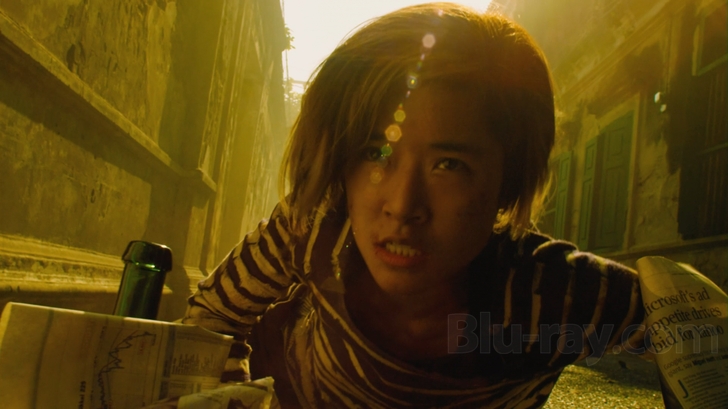
Raging Phoenix is a me-too beat 'em up with an incoherent plot, a pace that could put a crank addict to sleep, and a nearly ceaseless procession of nothing-we-haven't-seen-before Muay Thai moves. Unless you're some kind of fanatical apologist for all Thai martial arts movies—and it's amazing how many of those I've stumbled across on the internet—then Raging Phoenix will come as a disappointment, especially if you enjoyed the moderately-better Chocolate, "Jeeja" Vismistananda's previous film. Save your time and money and go watch Ong-Bak again instead.
Similar titles
Similar titles you might also like

Chocolate
2008

Ong Bak 2: The Beginning
2008

Ong Bak 3: The Final Battle
2010

Ip Man 3 4K
2015

Furie
Hai Phuong
2019

Five Superfighters
Tang shan wu hu / 唐山五虎
1979

Ong Bak: The Thai Warrior
2003

True Legend
Su Qi-Er
2010

Monkey Kung Fu
Stroke of Death / Chu long ma liu / 出籠馬騮
1979

Master Z: The Ip Man Legacy
2018

Fist of Legend
精武英雄
1994

Tai Chi Hero
Tai Ji 2: Ying Xiong Jue Qi
2012

Ip Man 2 4K
Yip Man 2 / Legend of the Grand Master | 葉問2
2010

Shaolin
新少林寺
2011

The Final Master
The Master / 师父 / Shi fu
2015

Power Kids
5 huajai hero / Force of Five
2009

The Wrath of Vajra
2013

Drunken Master
Zui quan
1978

Bushido Man: Seven Deadly Battles
2013

The Chinese Boxer
龍虎鬥
1970
